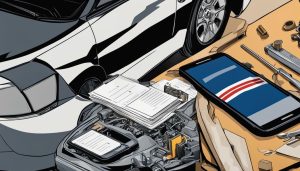Financing a car can be a good option for those who don’t have enough cash to purchase a vehicle outright. However, it’s important to consider the insurance requirements that come with car loans. Liability insurance is one of them, and it’s essential to comply with regulations and protect both yourself and the lender. In this section, we’ll explore the possibility of obtaining liability insurance for a car that is being financed and provide information on the necessary coverage for financed vehicles.
Key Takeaways
- Financing a car often requires liability insurance to comply with auto loan regulations.
- Liability coverage protects both the driver and the lender in case of damages or accidents.
- It’s important to understand the requirements and regulations related to auto loans and liability insurance.
- There are different liability insurance options available for financed vehicles.
- By understanding the process and selecting the right insurance provider, you can ensure you have the appropriate coverage for your financed vehicle.
Understanding Auto Loan Regulations and Liability Insurance
When financing a car, it is important to understand the regulations and requirements set forth by your auto loan provider. Generally, loan providers will require that you have liability coverage on your financed vehicle. This is because liability insurance protects both you and the lender in case of damages or accidents.
In order to obtain liability insurance for a financed car, you will need to meet the requirements set forth by your loan provider. These requirements may vary depending on the lender and the state in which you reside. Generally, your insurance policy will need to meet the minimum insurance coverage mandated by your state. Some states may require higher coverage amounts for liability insurance on financed cars.
When obtaining liability insurance for a financed car, it is important to find an insurance provider that meets the requirements set forth by your loan provider. Some loan providers may have specific insurance companies that they work with, while others may allow you to choose your own insurance provider. Regardless of the lender’s preference, it is important to find an insurance company that can provide you with the appropriate coverage at an affordable price.
To ensure that you are meeting the necessary requirements for liability insurance on a financed car, it is important to communicate with your loan provider and insurance company. You may need to provide proof of insurance coverage to your lender, such as a certificate of insurance. Additionally, you may need to update your insurance policy if your loan terms change or if you move to a new state with different insurance requirements.
Overall, it is important to understand the requirements and regulations related to auto loans and liability insurance when financing a car. By meeting the necessary requirements and selecting an appropriate insurance provider, you can ensure that you have the necessary coverage to protect both yourself and the lender in case of accidents or damages on a financed vehicle.
Liability Insurance Options for Financed Cars
If you are financing a car, it is important to have the appropriate liability insurance coverage to protect yourself and comply with auto loan regulations. There are different options available for liability insurance on a financed car, and it is important to understand the terms and conditions of each policy to choose the right coverage for your needs.
One option for liability insurance on a financed car is to add coverage to an existing policy. This can be done by contacting your insurance provider and requesting the addition of liability coverage to your policy. Another option is to purchase a separate liability insurance policy specifically for your financed car.
When choosing a liability insurance policy for your financed car, it is important to consider factors such as the level of coverage you need, your budget, and the deductible amount. It is also important to understand the exclusions and limitations of the policy, as well as any additional benefits that may be included.
Getting liability insurance for a car with financing can be a complex process, but by understanding your options and choosing the right coverage, you can protect yourself and your investment. Be sure to compare different liability insurance providers and policies to find the best fit for your needs.
Understanding the Importance of Liability Coverage for Financed Cars
When financing a car, having the appropriate insurance coverage is crucial. Liability coverage protects both the driver and the lender in case of accidents or damages. It is important to understand the significance of having liability coverage for a financed vehicle.
Car insurance for financed vehicles typically includes liability coverage, which covers damages caused to other people or their property in an accident. This coverage is required in most states and is designed to protect both the driver and others involved in the accident.
Liability coverage for financed cars is crucial because it not only protects the lender’s investment but also ensures that the driver has the appropriate coverage to pay for damages or injuries caused during an accident. Without liability coverage, the driver might end up paying out of pocket for these damages, which can be incredibly costly.
When considering liability coverage options, it’s important to understand the different types of liability coverage and choose the appropriate level of coverage based on your needs and budget. An insurance agent can help you determine the right amount of liability coverage needed to adequately protect your interests in case of an accident.
Navigating Auto Financing and Liability Insurance
Getting liability insurance for a financed car can be a tricky process, but it’s crucial to ensure you have the coverage you need. Here are some steps to navigate the process:
- Understand the regulations: Before you start looking for insurance, make sure you understand the requirements set forth by your auto loan provider. This will help you determine the coverage you need and any limitations or restrictions on your policy.
- Compare liability insurance options: There are many different providers that offer liability coverage for financed cars. It’s important to compare rates and coverage options to find the policy that best suits your needs and budget.
- Consider additional coverage: Liability coverage is required for financed cars, but you may also want to consider additional coverage to protect yourself and your vehicle in case of accidents or damages.
- Get multiple quotes: Don’t settle for the first insurance policy you find. Get quotes from multiple providers so you can compare rates and coverage options.
- Read the fine print: Make sure you carefully read and understand the details of your policy before signing on the dotted line. This will help you avoid any surprises or unexpected expenses down the road.
By following these steps and doing your research, you can successfully navigate the process of obtaining liability insurance for a financed car and ensure you have the coverage you need to protect yourself and your vehicle.
Exploring liability insurance providers for financed cars
Now that you understand the requirements and different liability insurance options for financed cars, it’s time to find the right insurance provider for you. Not all insurance companies offer coverage for financed cars, so it’s important to do your research beforehand to find a provider that offers the coverage you need.
Start by looking for insurance companies that specialize in auto insurance. These companies tend to have more experience dealing with auto loan regulations and can provide liability coverage tailored to your specific needs. You can also ask your auto loan provider for recommendations, as they may have partnerships with insurance companies that offer coverage for financed cars.
When comparing insurance providers, consider factors such as coverage limits, deductibles, and premiums. Some providers may offer discounts for bundling multiple types of insurance or for having a good driving record. Be sure to read the terms and conditions carefully to ensure you fully understand the coverage and any exclusions or limitations.
It’s also a good idea to check the financial stability and reputation of the insurance provider. Look for ratings from independent agencies such as Moody’s or A.M. Best to ensure the company is financially stable and has a good track record of customer satisfaction.
Remember, it’s important to have liability coverage for your financed car to protect both yourself and your lender in case of accidents or damages. Take the time to find the right insurance provider for your needs, and be sure to regularly review and update your coverage as necessary.
Conclusion
Auto financing and liability insurance go hand in hand when it comes to protecting yourself and your vehicle. By understanding the regulations and requirements involved in obtaining liability coverage for a financed car, you can ensure that you have the appropriate insurance in place.
When selecting an insurance provider, it’s essential to consider factors such as coverage options, pricing, and customer service. By exploring different liability insurance options for financed vehicles, you can choose the policy that best meets your needs and budget.
Stay Protected
Whether you’re purchasing a new or used car, it’s crucial to have the proper liability coverage in place to comply with auto loan regulations and protect yourself in case of accidents or damages. By navigating the process of obtaining liability insurance for a financed vehicle and selecting the right insurance provider, you can stay protected and drive with confidence.
FAQ
Can I get liability insurance on a financed car?
Yes, you can get liability insurance on a financed car. It is important to have adequate insurance coverage for your financed vehicle.
What are the requirements for liability insurance on a financed car?
The requirements for liability insurance on a financed car may vary depending on the auto loan provider. However, most lenders require you to have a minimum amount of liability coverage to protect their financial interest in the vehicle.
How do I obtain liability insurance on a financed vehicle?
To obtain liability insurance on a financed vehicle, you can contact insurance providers and compare quotes. It is important to provide accurate information about your financed car and the coverage you need.
Why is liability coverage important for financed cars?
Liability coverage is important for financed cars because it protects you and the lender in case of accidents or damages. It ensures that you have financial protection and can fulfill your obligations to the auto loan provider.
What should I consider when navigating auto financing and liability insurance?
When navigating auto financing and liability insurance, it is important to consider factors such as the coverage options available, your budget, and any additional requirements set by the auto loan provider. It is also crucial to understand the terms of the insurance policy and how it aligns with your financial obligations.
How do I choose the right liability insurance provider for my financed car?
When choosing a liability insurance provider for your financed car, consider factors such as their reputation, customer reviews, coverage options, and pricing. It is important to find an insurance company that offers the right balance of coverage and affordability for your specific needs.
Can I cancel liability insurance on a financed car?
It is generally not recommended to cancel liability insurance on a financed car, as it is typically required by the auto loan provider. Cancelling your insurance coverage may result in a breach of contract and could have legal and financial consequences.
What happens if I don’t have liability insurance on a financed car?
If you don’t have liability insurance on a financed car, it can be considered a breach of contract with the auto loan provider. They may take action to protect their financial interest in the vehicle, which could include repossessing the car or imposing insurance coverage on your behalf.
Can I switch liability insurance providers for my financed car?
Yes, you can switch liability insurance providers for your financed car. However, it is important to consider any terms and conditions set by the auto loan provider and ensure that you have continuous coverage to comply with your obligations.
What happens if I have an accident in a financed car without liability insurance?
If you have an accident in a financed car without liability insurance, you may be personally responsible for the financial consequences. This can include paying for damages to the other party’s vehicle, medical expenses, and legal fees.



Average Rating